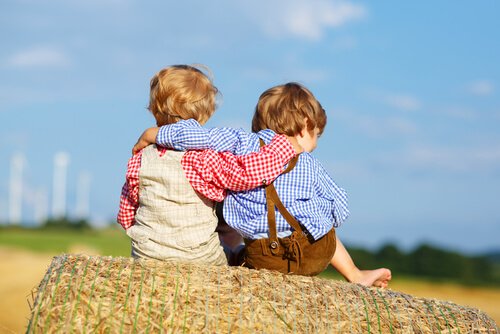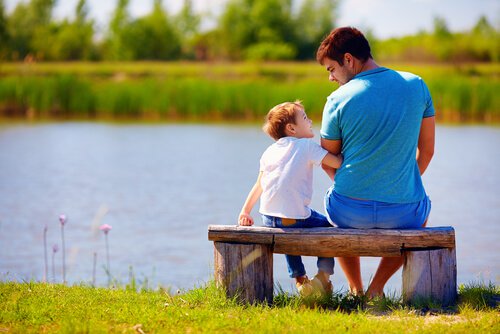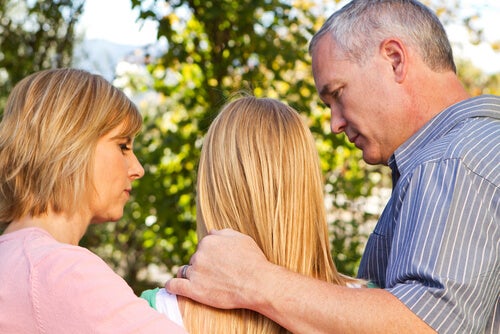(Stillness in the Storm Editor) We’re living in a world with a lot of wounded people. These wounds often go unnoticed, a kind of collective mass avoidance, pushed through cultural influence. In childhood, we’re extremely sensitive to emotional and social interactions. When parents accidentally breach a child’s trust, they cause damage that can create life long problems. But with a little courage, parents can be proactive in mitigating damage, using compassion and apology as a tool to emotionally support youngsters, while teaching them the importance of honor, trust, and compassion.
Related Cold-parenting Linked to Premature Aging, Increased Disease Risk in Offspring
Core beliefs are beliefs we form throughout life that govern our perception and behavior.
Most of the core beliefs we use every day, especially the negative ones, were formed when we were young, as a result of our home life. Due to the psychological nature of trauma, our negative core beliefs cause us to regress into a hurt child-like state when triggered.
You’ve likely seen this before in your various social circles. When someone you’re close to gets triggered, they can become irrational, emotionally toxic, and even bratty.
This behavior indicates what might be thought of as their hurt inner child overwhelming the adult mind. Once this happens, often the best way to restore order again is to treat the situation delicately, often by apologizing for the situation as if you were dealing with a child.
Such flare-ups are very common, especially today in our overly sensitive world.
Whether we’re dealing with actual children or adults who are managing negative core wounds, the solution is the same. To restore harmony again, trust needs to be restored.
Social bonds between people need to be healed.
In the heat of the moment, when we’re triggered, we often say things we regret or don’t mean. Learning how to forgive someone for their triggered upset is very helpful to restore trust again, while also holding them accountable for harm inflicted within a space of tolerance, compassion, and constructive discourse.
Children, when they are young, are very responsive to emotional transparency.
Sometimes, parents can justify a cold and stern approach, telling the child they did something wrong and punishing them, without revealing what the parent felt as a result. But studies show, emotional transparency from the parent not only alleviates their bitterness but shows the child the price of offensive behavior, namely that the parent was hurt by what the child did. Most children care about the emotional wellbeing of their parents, and if encouraged to cultivate this, can become extremely empathetic and emotionally healthy adults.
In a world where almost everyone suffers from negative core beliefs, as a culture, we need to highlight the causes of these problems, and take personal responsibility in ensuring we are a force for healing when we interact with others.
– Justin
(Exploring Your Mind) Apologizing to a child is responsible. As a father, a mother, or a teacher, if you fail a child, you need to be able to apologize to them. Lead by example and teach children that everybody makes mistakes.
Related Cold-parenting Linked to Premature Aging, Increased Disease Risk in Offspring
by Staff Writer, September 9th, 2019
Learning to apologize to children is important. However, many parents think that apologizing to their children is a sign of weakness. No, making a mistake won’t make them think less of you. This is a great moment to teach them about irresponsibility, something all of us should think about.
Something every parent or teacher tries to do is teach children the importance of apologizing whenever they do something wrong, lie, or when they’re impulsive and end up doing something disrespectful or dangerous. Knowing how to apologize is very important in life.
Buy Book Peaceful Parent, Happy Kids: How to Stop Yelling and Start Connecting (The Peaceful Parent Series)

Teaching children how to apologize from an early age makes it easier for them to feel empathy. It helps them take responsibility for their actions and be able to control themselves. This type of behavior sometimes isn’t that simple to learn. Sometimes adults don’t practice what they preach.
Adults don’t like to apologize because it makes them feel ashamed, making children believe that they’re incapable of making mistakes. Despite that, you need to learn something essential. Learning to apologize, and doing it, can improve your relationship with children and make it easier to teach them values.
“Saying ‘I’m sorry’ is saying ‘I love you’ with a wounded heart in one hand and your smothered pride in the other.”
-Richelle E. Goodrich-

The importance of apologizing to children
To understand the importance of apologizing to children, think of a time when someone hurt you, offended you, or lied to you and you didn’t get an apology for it. This hurts and it leaves a scar that time will never erase.
Now, imagine how a child feels when they’re hurt by a parent, their caretaker, or another loved one. If a child never hears an apology, this is what they’ll learn from that:
- Being a figure of power means they’ll never have to apologize.
- People can hurt who they love and everything will remain the same. There’s no need to apologize to someone you hurt.
What does a child learn when you apologize to them?
Pro-social conducts can spread emotions and feelings capable of changing people. The importance of apologizing to children lies in teaching them to be more cooperative, respectful, and know how to live with others. This way, they’ll learn:
- That everybody makes mistakes. The next step is to recognize what they did wrong and fix that situation.
- Although everybody feels ashamed when they apologize, doing it is an act of responsibility that’ll make them feel good afterward.
- When they apologize to someone, they’ll feel better.

Buy Book Unconditional Parenting: Moving from Rewards and Punishments to Love and Reason
When should parents apologize to their children?
- When you don’t keep your promises.
- When you yell at them. This is very common. Sometimes, when you’re stressed, you can lose your cool and raise your voice. This is something you should avoid and apologize for when it happens.
- Saying sorry when you forget something they were looking forward to doing.
- If something happens that keeps you from spending time with them.
- Apologize when you’re wrong about something and also whenever they feel offended.
How to apologize to a child?
Knowing how to apologize to a child correctly and effectively is important. It’s not just about saying you’re sorry, you need to do it right.
- A child can feel bad about something you think is meaningless. Don’t undermine their emotions. Recognize when you’ve wronged them and apologize sincerely.
- When you apologize to a child, explain why you’re doing it. “I’m apologizing because I told you we were going to movies, and we didn’t’. Your mom had to work another shift. I wanted to keep my promise, but I couldn’t. I’m sorry.”
- As soon as you feel you did something wrong, don’t wait too long to apologize. Don’t let them get frustrated and disappointed for long.
- Finally, promise them that it won’t happen again. Telling them you’ll try harder and showing you worry about them, is a way to lead by example, to inspire them to do the same and learn from you.
In short, being able to lead by example and properly teach children the value of forgiveness will lead to a more humane and respectful society.
Stillness in the Storm Editor: Why did we post this?
There are a great many factors that influence human consciousness. Arguably one of the most influential is the time we’re in the womb. Modern science and psychology continue to misinterpret prenatal and familial influences as genetic. However, a new understanding is emerging. Parents are faced with incredible challenges in the modern world. The Deep State has made being a parent a hindrance, a social problem, and a laborious task instead of the sacred joy that it truly is. If parents took more time to learn about the factors that influence their children, a new generation free of the hardships of the past would emerge that will have so-called superpowers simply due to the fact their innate potentials were allowed to blossom. The preceding information discusses the challenges and rewards of becoming a parent. With this knowledge in hand, the trials of being a parent can be alleviated simply by preparing for the child’s life before it has arrived. Additionally, the human race has yet to realize it’s full potential, but that potential is within our grasp should we choose to align ourselves to these fundamental truths.
– Justin
Not sure how to make sense of this? Want to learn how to discern like a pro? Read this essential guide to discernment, analysis of claims, and understanding the truth in a world of deception: 4 Key Steps of Discernment – Advanced Truth-Seeking Tools.
Stillness in the Storm Editor’s note: Did you find a spelling error or grammar mistake? Send an email to [email protected], with the error and suggested correction, along with the headline and url. Do you think this article needs an update? Or do you just have some feedback? Send us an email at [email protected]. Thank you for reading.
Source:

Leave a Reply